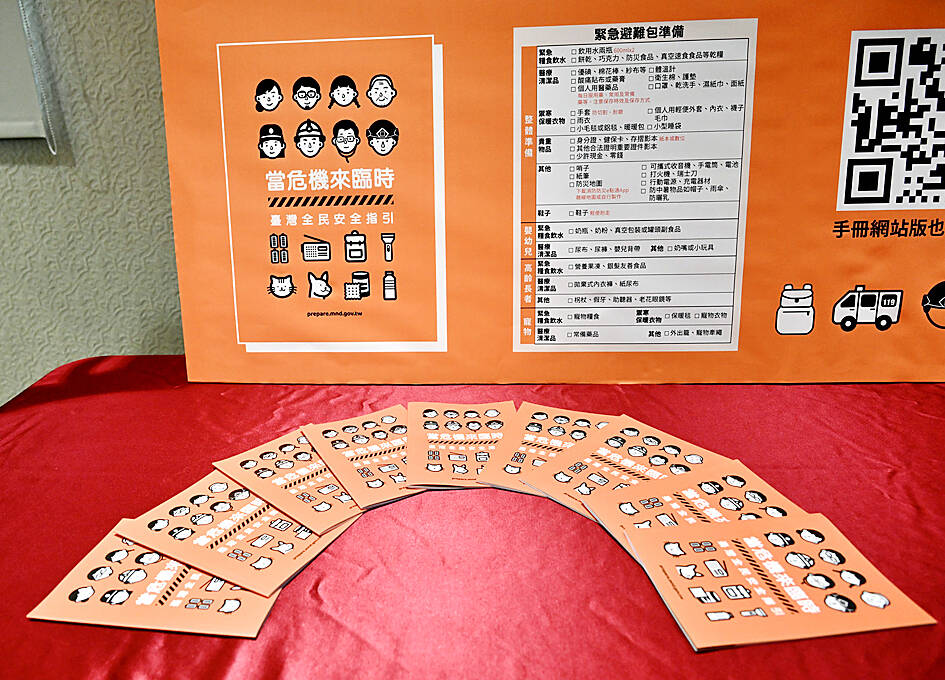The Ministry of National Defense’s All-Out Defense Mobilization Agency yesterday released its updated civil defense handbook, which defines the types of potential military aggression by an “enemy state” and self-protection tips in such scenarios.
The agency has released three editions of the handbook since 2022, covering information from the preparation of go-bags to survival tips during natural disasters and war.
Compared with the previous edition, released in 2023, the latest version has a clearer focus on wartime scenarios.

Photo: Lo Pei-de, Taipei Times
It includes a section outlining six types of potential military threats Taiwan could face, including destruction of critical infrastructure and most undersea cables, resulting in large-scale Internet outages; a hostile nation conducting patrols around Taiwan and demanding to inspect Taiwanese vessels; a hostile nation conducting live-fire drills near Taiwan or unilaterally designating no-sail zones under the pretext of military exercises; a hostile nation’s drones appearing in Taiwanese airspace; the other side of the Taiwan Strait unilaterally announcing a halt to cross-strait transportation and commercial activities; and a hostile nation launching attacks, armed aggression or sabotage/infiltration operations.
China has staged several large-scale military exercises around Taiwan following a visit to the nation by then-US House of Representatives speaker Nancy Pelosi in August 2022, with the most recent on April 2 codenamed “Strait Thunder-2025A.”
Other maneuvers listed include arbitrary boarding and inspection of Taiwanese-registered civilian ships, unilaterally suspending traffic and commercial activities across the Taiwan Strait, sending drones into Taiwan’s territorial airspace and launching an attack followed by an armed invasion.
In another section, the handbook states that if an area comes under attack, residents should go to the nearest basement. People trapped indoors should stay behind two walls and away from exterior walls, while people outdoors should lie prone, facing away from explosions and protect their heads.
If people come across apparent members of enemy forces, they should quickly leave the area or take shelter, it says.
Another update is a warning against wartime messages that the government has surrendered or that the military has been defeated, expressly stating that such information is “false.”
The new guide also includes a section encouraging people to candidly discuss the threat of war with their children, involve them in preparing go-bags, teach them how to recognize disinformation and help ease their anxiety about war.
The guide further features a chapter with information on how to become a certified disaster prevention specialist or enlist in the armed forces.
Shen Wei-chih (沈威志), head of the agency’s Materials Mobilization Division, yesterday said that the updated handbook was compiled under the guidance of the Presidential Office’s Whole-of-Society Defense Resilience Committee.
Shen said that 5,000 hard copies would be printed for distribution initially in limited numbers at selected PX Mart stores across the nation.
Downloadable Chinese and English-language (https://prepare.mnd.gov.tw/assets/pdf/manual-en.pdf) electronic versions are also available, he said.
“Why are we releasing this handbook during a time of peace? It is not to create panic, but to tell people you need to make preparations while there is peace, so when a crisis happens you know what to do,” he said. “The earlier you are prepared, the earlier you study [the booklet], the earlier you would be safe.”
Shen said the government wants people to put a copy of the handbook in grab bags containing emergency supplies stored in an easily accessible locations.
Additional reporting by Chen Yu-fu and Reuters

The Central Election Commission has amended election and recall regulations to require elected office candidates to provide proof that they have no Chinese citizenship, a Cabinet report said. The commission on Oct. 29 last year revised the Measures for the Permission of Family-based Residence, Long-term Residence and Settlement of People from the Mainland Area in the Taiwan Area (大陸地區人民在台灣地區依親居留長期居留或定居許可辦法), the Executive Yuan said in a report it submitted to the legislature for review. The revision requires Chinese citizens applying for permanent residency to submit notarial documents showing that they have lost their Chinese household record and have renounced — or have never

A magnitude 5.6 earthquake struck off the coast of Yilan County at 12:37pm today, with clear shaking felt across much of northern Taiwan. There were no immediate reports of damage. The epicenter of the quake was 16.9km east-southeast of Yilan County Hall offshore at a depth of 66.8km, Central Weather Administration (CWA) data showed. The maximum intensity registered at a 4 in Yilan County’s Nanao Township (南澳) on Taiwan’s seven-tier scale. Other parts of Yilan, as well as certain areas of Hualien County, Taipei, New Taipei City, Taoyuan, Hsinchu County, Taichung and Miaoli County, recorded intensities of 3. Residents of Yilan County and Taipei received

Taiwan has secured another breakthrough in fruit exports, with jujubes, dragon fruit and lychees approved for shipment to the EU, the Ministry of Agriculture said yesterday. The Animal and Plant Health Inspection Agency on Thursday received formal notification of the approval from the EU, the ministry said, adding that the decision was expected to expand Taiwanese fruit producers’ access to high-end European markets. Taiwan exported 126 tonnes of lychees last year, valued at US$1.48 million, with Japan accounting for 102 tonnes. Other export destinations included New Zealand, Hong Kong, the US and Australia, ministry data showed. Jujube exports totaled 103 tonnes, valued at

BIG SPENDERS: Foreign investors bought the most Taiwan equities since 2005, signaling confidence that an AI boom would continue to benefit chipmakers Taiwan Semiconductor Manufacturing Co’s (TSMC, 台積電) market capitalization swelled to US$2 trillion for the first time following a 4.25 percent rally in its American depositary receipts (ADR) overnight, putting the world’s biggest contract chipmaker sixth on the list of the world’s biggest companies by market capitalization, just behind Amazon.com Inc. The site CompaniesMarketcap.com ranked TSMC ahead of Saudi Aramco and Meta Platforms Inc. The Taiwanese company’s ADRs on Tuesday surged to US$385.75 on the New York Stock Exchange, as strong demand for artificial intelligence (AI) applications led to chip supply constraints and boost revenue growth to record-breaking levels. Each TSMC ADR represents